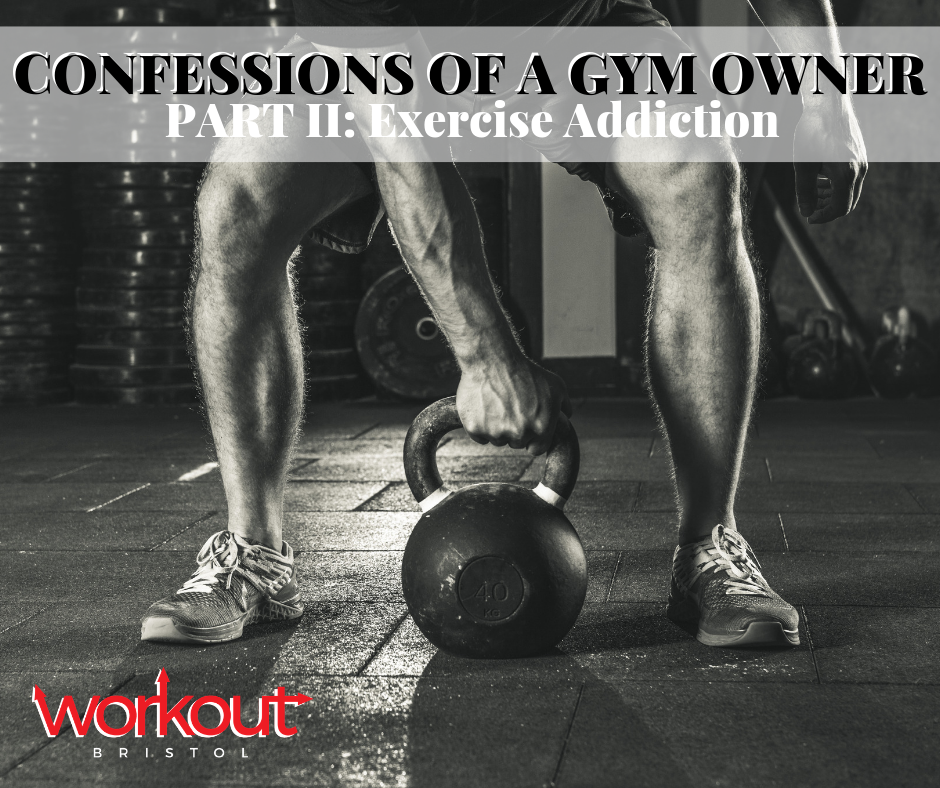
PART II: Exercise Addiction
What's the Difference Between a Healthy, Excessive Enthusiasm, and an Addiction?
My answer? A healthy, excessive enthusiasm adds to your life, whereas an addiction takes away from it.
Exercise addiction is thought to impact about 3% of regular gym-goers, but does vary based on the population studied, the type of physical activity, and the level of competition. For example, among sport science university students, that figure jumps to almost 7%... and when it comes to runners, research suggests 25% of amateurs could qualify as exercise addicted, with the prevalence doubling to 50% in marathon runners and 52% in triathletes. From a personal perspective, I would say that I have had an "colourful relationship" with exercise for about 15 years now. I've been involved in sport and exercise my whole life and have suffered some gruelling injuries along the way (still am to be honest). Sport and exercise is not only my hobby, but has also been my whole career. I studied Leisure and Outdoor Activity Management at university, and have managed fitness businesses, gym chains, sports brands, and nutritional companies... But enough about me, we'll save that for a future blog post ;)
Sport and exercise is not only my hobby but has been my whole career, I studied Sports Science in college, Leisure and Outdoor Activity Management at university and have gone on to manage many fitness businesses, gym chains, sports brands, and nutritional companies... But enough about me, we'll save that for a future blog post ;)
Key Components of Exercise Addiction
Remember that doing something habitually or excessively does not necessarily make it problematic. So, how do you know if you might have an addiction, or, if you just like to train a lot? As always, I'm prefacing this with a disclaimer that I'm not a medical professional/expert, but to me, an addiction to something might comprise of a number of key components, including:
- Overriding preoccupation with the behaviour
- Conflicting with other activities or relationships as a result
- Withdrawal symptoms (irritability) when unable to engage in the behaviour
- Increase of the behaviour over time (tolerance)
- Use of behaviour to alter mood state
- Cravings for the behaviour
- Feeling out of control
Funny enough, you'll notice that "exercising a lot" is not explicitly mentioned on this list... and people can get addicted to exercise for a variety of reasons (again - not a medical professional, just speaking from experience):
- Eating disorders
- Feeling under pressure to look a certain way; using exercise to attain this image
- Media and social media exposure
- Endorphins and dopamine addiction
- Stress and anxiety relief
- Overcompensating for a poor diet
- And many more...
So Why Is Exercise Addiction A Bad Thing?
There is a fine balance between being at your peak condition, and tipping the edge into being unhealthy due to excessive physical activity. If you haven't already seen it, there was a great documentary on the BBC last week about Sam Warburton, a Welsh Rugby player. The film was a true representation of how, for example, a top athlete, can tip over the edge. Sam actually ended up retiring at 28 years old!
Even for me personally, the impact that my exercise addiction has had on my body is now starting to show. I am 37 years old (I know, I know, you thought I was much older than that!) and have acute tendonitis in both knees, a neck injury that has given me extreme pain for almost a year, I've started developing arthritis throughout my body... the list goes on. And yet I still continue to exercise for multiple hours, day after day, after day, after day. Believe it or not, I have actually reduced my training volume over the past 18 months, as prior to this I was probably taking part in around 7 hours of intense physical exercise a day. Perhaps you find it odd that I'm admitting these types of problems to you, but please know that I want to bring you as much value as possible, so I feel it's very important that I be real and honest with you... in hopes that I can help at least one person prevent the same mistakes that I have made.
Exercising every day... even exercising for multiple hours per day, isn't necessarily bad for you... as long as you plan that type of volume correctly, and within a well-balanced day. It is also worth saying that you do not, and should not, hit every session as hard as you possibly can - it will ruin your body. Trust me. I am living proof of that. LISTEN TO YOUR BODY. When I was younger, my coaches would tell me to reign it in, but back then, the potential risks of overtraining did not concern me. Becoming older and walking around like Robocop, as I do now, just seemed so far off that I didn't care: I was more concerned with smashing every session to be at my very best, and I'm paying for that now.
Healthy Exercise, Social Media, and More
So, you might be wondering... "what is a healthy level of exercise?" and well, that's like asking me "how long is a piece of string..." The volume of exercise that is right for you personally, is exactly that: personal. But if you do feel that exercise has control over you, or it impacts your life negatively (i.e. you miss out on other important activities or are constantly getting ill and/or injured), then it's probably time to re-assess your training schedule. If you need professional help with this, we've got some great PTs at the club that can certainly help you. Remember that there is a PT information board just inside the cardio room where you can find everything you need to get in touch with them and solicit advice.
Finally, I'll leave you with a word about social media. All forms of media, actually. Remember that media can have both a positive and negative impact on exercise habits. For some, seeing images and hearing stories about other's fitness journeys can be quite motivating. For others, seeing these types of images can make them feel pressured to look a certain way. Please remember that just because someone looks "healthy" or "good" on the outside, it doesn't always mean they are feeling healthy or good on the inside. I regularly get comments like "you're looking in great shape!" but as you now know, sometimes on the inside I could only describe it as a complete wreck. I caution you: try not to get drawn into training to look good rather than to feel good. Eat and train for your health, and I promise you that as a natural bi-product, you'll look great too!
Yours in Fitness, Health, and Sport,
Craig






